A PIPELINE TO GREAT THEATER
The title of Pipeline refers to the much-reviled “school-to-prison” conduit that keeps minority kids from any outcome but incarceration, soft or hard. It’s driven by a fatal fusion of low and self-fulfilling expectations of failure, endless and pointless discipline, and inadequate encouragement or alternatives to crime. Disadvantage can take many forms.
It’s powerfully presented in 90 minutes in Dominique Morriseau’s essential drama, a Victory Gardens Chicago premiere kinetically shaped by Cheryl Lynn Bruce.
Both concentrated and all-embracing, Morisseau’s one-act focuses on Nya Joseph (Tyla Abercrumbie in a labor of love and desperation), a divorced mom and public-school teacher who’s trying to save her son Omari (Matthew Eslam, caught in confusion) from being sucked into the pipeline. This English teacher dreads the thought that Gwendolyn Brooks’s urban lyric “We Real Cool” — a lament for and from doomed drop-outs (akin to Langston Hughes’s “Raisin in the Sun”) — will come true for her sole son, especially the last line: “We die soon.”
Though his mother teaches at a battlefront high school, Omari has been sent by his wealthy but uninvolved dad Xavier (a deeply conflicted Mark Spates Smith) to a private school upstate. He’s meant to get a better chance than Nya’s students ever can. But Omari has brought with him a toxic legacy, a lifetime of rage for “respect” against the dad who was never there and the dreams he fears he’s denied.
In an incident that could send Omari into a black hole of repeat offenses, this raw-nerved teenager is faced with a “third strike” expulsion for slamming his teacher against the smartboard. On a bad day when he just wanted to be left alone, Omari is thrown into a blind fury when this uncaring adult closely questions him about his resemblance to Bigger Thomas, the reflexive murderer in Richard Wright’s Native Son. Omari takes it painfully personally, this cross-examination that likens him to an animal with social limitations who can only prove he’s real by striking out. Has life imitated art in the worst way?
Morisseau enlarges the context for her showdown between son and parents and son and school: She offers her own witnesses for the prosecution. Laurie (fierce Janet Ulrich Brooks) is Nya’s white colleague, a traumatized teacher who’s all but burnt out over always being “at war.” She seethes with the frustration of refereeing angry boys who have “grown down.” She just wants to teach promising citizens in what she ambiguously calls “my den.” She dreads getting stuck fixing other people’s errors.
Then there’s the school’s underpaid and too-tested security guard Dun (Richard L. Conner, stretched to breaking). Caught in the crossfire, he’s trying not to become an advance guard for the prison pipeline. But everything he sees seems to conspire against giving youths of color a second or even first chance.
Finally, there’s Omari’s girlfriend Jasmine (Aurora Real de Asua, sparking fire from every line). The only peer here (to put Omari in perspective) and another only child, this proud and frustrated would-be lover is loyal to a guy who keeps disappearing on her. Refusing to fit in with the mean white girls in this educational enclave, Jasmine finds common cause with Omari, even as he needs to feel that nobody “gets” him.
To the playwright’s credit and the cast’s merit, we see six embattled characters from all sides — without judgment and from the inside out. But the moral “ground zero” here is Nya. Fighting off panic disorders and emotional paralysis, Nya agonizes that she can do nothing right to keep Omari from self-destructing. But she can’t abandon him as his father seems to have done.
From the start Pipeline seems headed for a crackup. But Morisseau is too honest to give in to Omari’s predictable implosion. It’s not too late for mother and son to listen and learn from each other. Omari manages to imagine solutions to a problem that’s hardly his alone. It involves a healthy mix of tough love and letting loose, of tracking rock-hard resentments back to sources that can be solved, and of giving Omari “space” (a big word here) to learn from mistakes without forfeiting the future.
No more than Nya with her son, Morisseau refuses to give up on her often-eloquent survivors. They won’t be counted out to “die soon.” By play’s end, a ton of love and light gets shown on a harsh, seemingly unforgiving closed world — and it opens up beautifully. Victory Gardens begins its 44th season with a lot to cherish.
photos by Liz Lauren
Pipeline
Victory Gardens Theater, 2433 N. Lincoln Ave
Tues-Fri at 7:30; Sat at 3 & 7:30; Sun at 3
ends on March 3, 2019
for tickets, call 773.871.3000 or visit Victory Gardens
for more shows, visit Theatre in Chicago

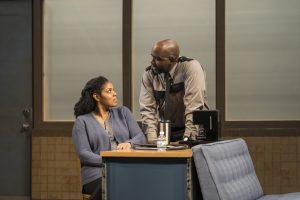
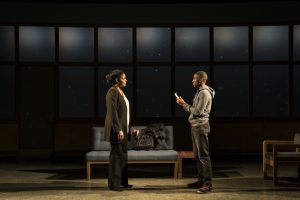
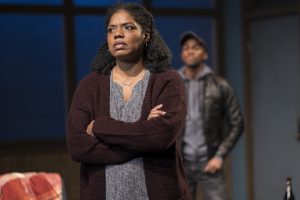
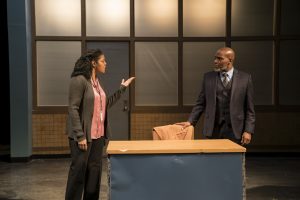


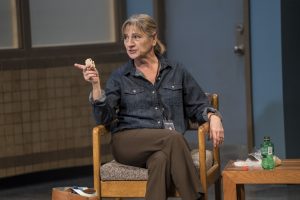

{ 1 comment… read it below or add one }
Beautifully written review. This show is Victory Gardens at its best.